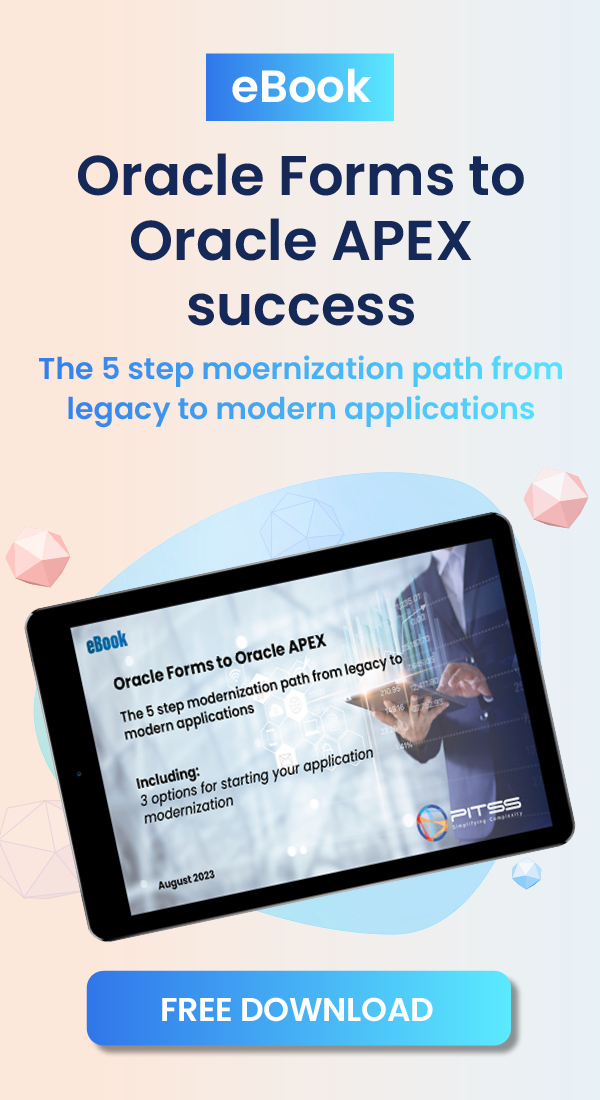Earlier we reported that the NPAPI plugin embedded in web browsers to run Oracle Forms applications are not only out of support but also have been removed from web browsers such as Chrome and Firefox. More information on this may be found in our article here. Starting in Oracle Forms 12c, Oracle has certified two other ways to launch Oracle Forms besides using the NPAPI plugin: Java Web Start (JWS) and Forms Standalone Launcher (FSAL). FSAL is a browser-less solution which allows you to run your Oracle Forms applications without needing to use a web browser. Users may be able to access the application by either running a command from Command Prompt or by running a CMD script on the desktop similar to the days when Oracle Forms was a client/server application back in the Forms 6i days. Before you can get started with using FSAL, the following prerequisites need to be met before you can run Oracle Forms using Forms Standalone Launcher:
Prerequisites
- A couple of web-based parameters will need to be added to the application server’s formsweb.cfg file (more information is covered in this article)
- Each end user must be provided a jar file, frmsal.jar, from the application server in which Oracle Forms is installed
- Each end user must either have a JDK or JRE installed. For Oracle Forms 12.2.1.4.0, only JDK 1.8.0_211+, JRE 1.8.0_211+, JDK 11.0.4+, and JDK 17.0.0+ are supported. Keep in mind that JDK 11.0.4+ and 17.0.0+ are only supported with Forms when using FSAL.
- The JDK or JRE must be in the end user’s PATH environment variable
Setup
Once all prerequisites have been met, you may proceed with setting up your Forms and Reports environment to use FSAL:
1. Open up formsweb.cfg in $DOMAIN_HOME/config/fmwconfig/servers/WLS_FORMS/applications/formsapp_12.2.1/config
2. Locate your configuration section for your applications. The name of your application section will be surrounded by brackets such as [app]. If you are not using separate configuration sections for your applications, you may configure this within the [default] configuration section. However, if you do so, this must be done before the [sepwin] section.
3. Add the following parameters to the end of your application configuration section:
- baseSAAfile=webutilsaa.txt
- fsalcheck=true
4. Save and close the file
5. If you have not already done so, locate your frmsal.jar file in $ORACLE_HOME/forms/java and provide this to all end users whom will run the Forms application(s).
Launching Your Oracle Forms Application with FSAL
Now that your Oracle Forms environment has been configured, your end users may now run your Forms application(s) using Forms Standalone Launcher:
1. Make sure all end users have either a JDK or JRE in their PATH environment variable.
- Example: PATH=C:\Program Files\Java\jre1.8.0_261\bin;…
2. Open up Command Prompt or cmd.exe.
3. Run the following command to call the app (in this example we will have our application section called “app_fsal”):
- java -jar <PATH_TO_frmsal.jar>\frmsal.jar -url “http://<app_server_url>:<forms_port>/forms/frmservlet?config=fsal”
- Example: java -jar C:\Users\Pitss\Downloads\frmsal.jar -url “http://app-server.domain.com:9001/forms/frmservlet?config=fsal”
Alternatively, you may also configure a batch or CMD script to be set up on end users’ PCs to easily run the java command above. All you will need to do is create the script to run the same java command in item #3 above and place the script on the users’ desktops.
After launching the java command either from Command Prompt or from a CMD script, your Oracle Forms login screen will now appear. You may now log into your application normally. This will allow you to run the app independently from the web browser. If your Oracle Forms application needs to run a report with Oracle Reports, Oracle BI Publisher, JasperReports, etc, a web browser will be launched to run the report using your default web browser.
PITSS.CON is also able to be used with Forms Standalone Launcher. Click here to learn more on how this can be done. For more information regarding Forms Standalone Launcher (FSAL), please feel free to check out Oracle’s white paper here.



